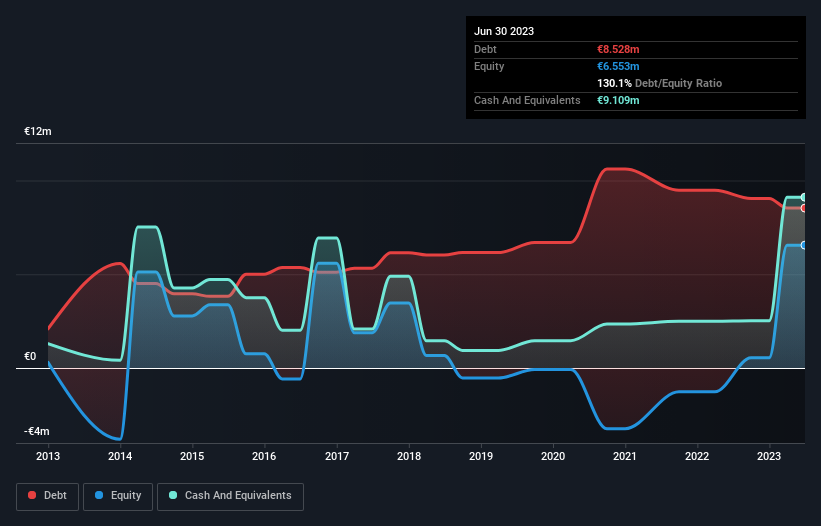
Warren Buffett famously said, 'Volatility is far from synonymous with risk.' So it seems the smart money knows that debt - which is usually involved in bankruptcies - is a very important factor, when you assess how risky a company is. We note that Theraclion SA (EPA:ALTHE) does have debt on its balance sheet. But the real question is whether this debt is making the company risky.
What Risk Does Debt Bring?
Debt and other liabilities become risky for a business when it cannot easily fulfill those obligations, either with free cash flow or by raising capital at an attractive price. Part and parcel of capitalism is the process of 'creative destruction' where failed businesses are mercilessly liquidated by their bankers. However, a more common (but still painful) scenario is that it has to raise new equity capital at a low price, thus permanently diluting shareholders. Of course, debt can be an important tool in businesses, particularly capital heavy businesses. When we examine debt levels, we first consider both cash and debt levels, together.
Check out our latest analysis for Theraclion
What Is Theraclion's Debt?
The image below, which you can click on for greater detail, shows that Theraclion had debt of €8.53m at the end of June 2023, a reduction from €9.48m over a year. However, its balance sheet shows it holds €9.11m in cash, so it actually has €580.9k net cash.

How Strong Is Theraclion's Balance Sheet?
We can see from the most recent balance sheet that Theraclion had liabilities of €5.98m falling due within a year, and liabilities of €8.34m due beyond that. On the other hand, it had cash of €9.11m and €4.11m worth of receivables due within a year. So its liabilities total €1.10m more than the combination of its cash and short-term receivables.
Given Theraclion has a market capitalization of €19.9m, it's hard to believe these liabilities pose much threat. However, we do think it is worth keeping an eye on its balance sheet strength, as it may change over time. Despite its noteworthy liabilities, Theraclion boasts net cash, so it's fair to say it does not have a heavy debt load! The balance sheet is clearly the area to focus on when you are analysing debt. But it is Theraclion's earnings that will influence how the balance sheet holds up in the future. So when considering debt, it's definitely worth looking at the earnings trend. Click here for an interactive snapshot.
Over 12 months, Theraclion reported revenue of €1.9m, which is a gain of 153%, although it did not report any earnings before interest and tax. So its pretty obvious shareholders are hoping for more growth!
So How Risky Is Theraclion?
Statistically speaking companies that lose money are riskier than those that make money. And we do note that Theraclion had an earnings before interest and tax (EBIT) loss, over the last year. And over the same period it saw negative free cash outflow of €3.3m and booked a €4.9m accounting loss. Given it only has net cash of €580.9k, the company may need to raise more capital if it doesn't reach break-even soon. Importantly, Theraclion's revenue growth is hot to trot. High growth pre-profit companies may well be risky, but they can also offer great rewards. When analysing debt levels, the balance sheet is the obvious place to start. But ultimately, every company can contain risks that exist outside of the balance sheet. We've identified 3 warning signs with Theraclion (at least 1 which is a bit concerning) , and understanding them should be part of your investment process.
If, after all that, you're more interested in a fast growing company with a rock-solid balance sheet, then check out our list of net cash growth stocks without delay.
If you're looking to trade Theraclion, open an account with the lowest-cost platform trusted by professionals, Interactive Brokers.
With clients in over 200 countries and territories, and access to 160 markets, IBKR lets you trade stocks, options, futures, forex, bonds and funds from a single integrated account.
Enjoy no hidden fees, no account minimums, and FX conversion rates as low as 0.03%, far better than what most brokers offer.
Sponsored ContentValuation is complex, but we're here to simplify it.
Discover if Theraclion might be undervalued or overvalued with our detailed analysis, featuring fair value estimates, potential risks, dividends, insider trades, and its financial condition.
Access Free AnalysisHave feedback on this article? Concerned about the content? Get in touch with us directly. Alternatively, email editorial-team (at) simplywallst.com.
This article by Simply Wall St is general in nature. We provide commentary based on historical data and analyst forecasts only using an unbiased methodology and our articles are not intended to be financial advice. It does not constitute a recommendation to buy or sell any stock, and does not take account of your objectives, or your financial situation. We aim to bring you long-term focused analysis driven by fundamental data. Note that our analysis may not factor in the latest price-sensitive company announcements or qualitative material. Simply Wall St has no position in any stocks mentioned.
About ENXTPA:ALTHE
Theraclion
Designs and markets high-tech therapeutic ultrasound equipment.
Slight with mediocre balance sheet.
Market Insights
Community Narratives



